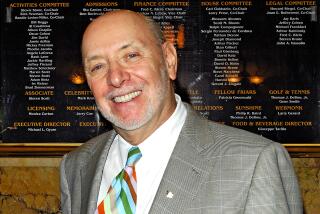Horst Buchholz, 69; Actor Was Known as the James Dean of German Cinema
- Share via
Horst Buchholz, a German actor whose Hollywood credits include a communist heartthrob in Billy Wilder’s Cold War satire “One, Two, Three,” died Monday in Berlin, a hospital said. He was 69.
Buchholz, who was recovering from a broken thighbone, died in intensive care at the Charite hospital, spokeswoman Kerstin Ullrich said. The cause of death was pneumonia.
For the record:
12:00 a.m. March 5, 2003 For The Record
Los Angeles Times Wednesday March 05, 2003 Home Edition Main News Part A Page 2 National Desk 1 inches; 40 words Type of Material: Correction
Buchholz obituary -- An obituary of actor Horst Buchholz in Tuesday’s California section said the film “Life Is Beautiful” was released in 1997. In fact, it was released in Europe in 1997 and in the United States in 1998.
Dubbed the James Dean of German films for the rebellious teens he played in the late 1950s, Buchholz moved to the United States and scored his first Hollywood hit with a role as a young gunman in “The Magnificent Seven,” the 1960 western with Yul Brynner and Steve McQueen.
The next year, director Billy Wilder cast him alongside James Cagney in “One, Two, Three.” Set around the building of the Berlin Wall, the biting comedy features Cagney as a Coca-Cola executive who learns his boss’ daughter has secretly married a communist, played by Buchholz.
He also made movies in Britain, Spain, Italy and France, and played a Nazi concentration camp doctor in Roberto Benigni’s Oscar-winning 1997 film, “Life Is Beautiful.”
Born Dec. 4, 1933, in Berlin’s working-class Prenzlauer Berg district, the shoemaker’s son survived World War II in the countryside, where officials sent children to protect them from Allied bombing raids.
Broadway Debut
In the tough postwar years, Buchholz landed his first stage role at 15 in a Berlin theater version of the German children’s classic “Emil and the Detectives.” He dropped out of high school in 1950, took acting lessons and worked toward his film career with roles on Berlin stages over the next five years. His Broadway debut came in 1959 in “Cherie.”
He made his film debut under the French director Julien Duvivier in “Marianne -- meine Jugendliebe” (Marianne My Youthful Love). By 1957, his first five films had raised him to the heights of popularity in Germany.
Other notable roles in European films included the Russian soldier in “Sky Without Stars,” as a romantic painter opposite Romy Schneider in “Mon Petit,” and Thomas Mann’s raking hero in “The Confessions of Felix Krull.”
His American career, however, was waylaid by a series of films that earned poor notices, including “Nine Hours to Rama,” in which he played Gandhi’s assassin; “The Empty Canvas,” in which he played Bette Davis’ son; and the trouble-plagued “Marco Polo.”
He is survived by his wife, Myriam Bru; his son, Christophe, an actor; and a daughter, Beatrice.
Funeral arrangements are pending.
More to Read
Only good movies
Get the Indie Focus newsletter, Mark Olsen's weekly guide to the world of cinema.
You may occasionally receive promotional content from the Los Angeles Times.









